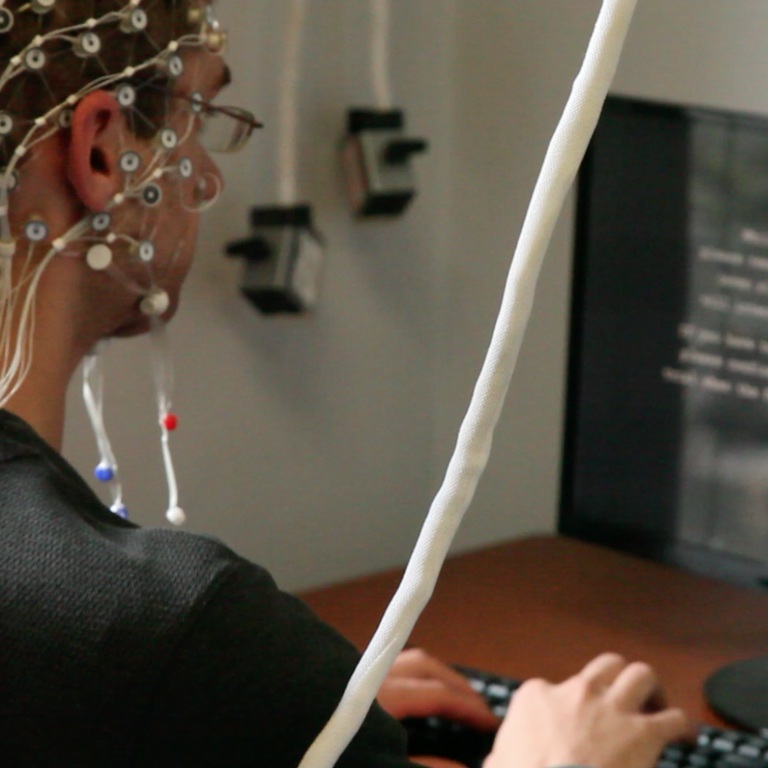Amishi Jha is an Associate Professor in the Department of Psychology at the University of Miami. The Jha lab explores the stability and mutability of attention and working memory. With large contributions to the field of contemplative practice, her research spans from cohorts of military to teachers to adolescents. Her work focuses on questions of paying attention, the impact of stress and disease on attention, and developing resilience.
The following is an excerpt from the documentary film The Science of Wisdom. The interview takes place at the International Symposium for Contemplative Studies in Boston hosted by the Mind and Life Institute. In this conversation, Dr. Jha discusses attention in high stress groups, the benefits of mindfulness practice in incarcerated youth, and bringing wisdom traditions to the forefront of science.
Jean: Your research spans a variety of neuropsychological studies including working memory capacity, attention, and neural correlates with contemplative practices. What led you to start your research in mindfulness?
Dr. Jha: Most of my career has been spent studying the basic brain mechanisms of attention. In 2003 as an assistant professor at the University of Pennsylvania, having just had a small child, teaching a full load, and running the lab, I basically was at my end in terms of stress. It was this defining moment where I had essentially lost feeling in my teeth from grinding them and had to give a talk at a faculty retreat about all the work that we were doing in my lab. But I couldn't talk. To me I thought maybe I need to pay attention to what's going on. Around the same time, Richie Davidson was giving a talk at the University of Pennsylvania. He showed these pictures- basically an electrical profile, a topographical voltage map of the brain image of somebody who had been induced to be in a negative mood. It had a particular asymmetry. Next to it, he had another profile of a brain, of a person that was in a positive mood. My question was, 'How do you get that negative one to look positive?' It was the end of the question-answer session, and he just looked up and said, "Meditation". So, that was it. That summer, I ended up going to the bookstore, picking up a book on mindfulness meditation for beginners by Jack Kornfield, and committed to doing the practices in that book. It changed everything about my own experience. It was like a flash going off in my mind--not only do I feel better, but this is something to do with attention. All the instructions were around attention. I know a lot about attention. I'm going to study this. Now I have a purpose for how I can apply it. I haven't stopped studying this intersection between these basic brain mechanisms.
Jean: What are some of your findings from your research?
Dr. Jha: Well, we are so early in tracking how different kinds of high performance or high stress groups benefit- if they benefit- from mindfulness meditation in particular. The motivation behind doing it is that they share a lot of features of their stress level. For some of these groups, we can even predict what the cyclic nature of their stress is going to be. For a student, at the beginning versus the end of the semester, stress levels increase and attention decreases. In the military context, as they're preparing for deployment, attention decreases and stress levels increase. Then deployment itself is a whole other story. From the business and sports context, it's a similar kind of thing. So, my question was a more basic question around the role of improving attention in the service of resilience. How might we offer mindfulness training to people to protect against the kind of onslaught of the degradation their life is experiencing? Can we bolster up the resources at risk for degrading over a high stress period of time? And in my mind that is going to be a key aspect of promoting resilience in people. I would say the bulk of the field of resilience is looking at coping mechanisms, social support, or individual differences in intrinsic resilience. I'm taking more of a cognitive or cognitive training approach in how we get those things that are at risk for declining to stay strong.
Jean: You have a study on incarcerated youth. Can you explain a bit about that?
Dr. Jha: We did a study with incarcerated youth that was in collaboration with the NYU School of Nursing. Noelle Leonard was the first author on it, and she was interested in providing mindfulness programs for youth. As these children enter the juvenile justice system, the thing we're trying to get them to be better at is their ability to control their emotions and making better decisions. However, this very thing may be at risk for being more compromised by just having entered that system. That to me is horrible. Not only are we going to take them out of society, but then instead of bolstering them, we're degrading them and putting them back out there. When you compare treatment as usual to a mindfulness-based cognitive therapy program, you can see differences. The most striking thing was that the treatment as usual group declined over the period of time that they were incarcerated. The group that got the mindfulness-based cognitive therapy didn’t decline. Within that group, the children that practiced above and beyond the minimal amount actually got a little bit better. That gave me a sense of hopefulness that this type of training may grow the resources that they need.
Jean: Do you think if you took those same types of practices and introduced them into neighborhoods prior to youth getting into trouble that you would see similar types of responses?
Dr. Jha: That's my strong hunch. That's the kind of work that the group the Holistic Life Foundationis doing. We've been trying to figure out a way to pair up to track their work. There are some good studies that they have been doing with Johns Hopkins. The intention is that you don't have to wait for people to decline to the point where they are in the juvenile justice system before you can help.
Jean: Would you say that there could be a link between wisdom and mindfulness/contemplative practice?
Dr. Jha: Wisdom is a hard construct. I would say that part of what contemplative practice offers is this ability to reflect, know how we behave, what our tendencies are, and even be more consciously [aware]. If you think about wisdom as the trajectory of learning about who we are and how we relate to the world…that improves through the course of engaging in these [types of contemplative] practices.
Jean: You were in an open discussion forum with the Dalai Lama on Friday morning. Can you talk to us about the intersection of the sciences and religious practice?
Dr. Jha: When I think about the kind of work that I do in my lab, the intention is to take in a sense of benefit from the world's wisdom traditions and figure out how to offer those to people in a secular fashion. So, the question is -what are you leaving out? What aspect of the thing is part of the secular practice? We are essentially not incorporating an overarching belief system in what we are offering. The practices themselves actually end up being quite acceptable to people. Things like the breath or paying attention to your body/body scans or thinking about kindness and connection are not terrain of any particular tradition. When I think about religious practices, what we're doing- maybe not even intentionally- is kind of extracting out the common elements across many different traditions and then bringing them to the laboratory to see how they change the way the brain works and how attention works. I think the one thing that's really important to keep in mind, as we think about wisdom, is to make sure that it is applied in the real world. We've got a planet that has seven billion people on it. If wisdom and wisdom practices are esoteric and only for the few, we will never benefit from the world's wisdom traditions. Part of what I see my role and my passion as doing is benefitting and translating into a way that might be more acceptable and accessible to people by applying the scientific lens to wisdom practices. And I think that is something that I would want to encourage more scientists to do, especially in the contemplative neurosciences. For the purposes of understanding brain mechanisms of esoteric practices, it's very interesting. However, that's only one part of the picture. The real benefit of the world's wisdom traditions is to help the world become more wise.

Amishi Jha, Ph.D.
Associate Professor of Psychology, University of Miami
Reference
The Science of Wisdom, produced by the JJ Effect, directed by Jason Boulware



